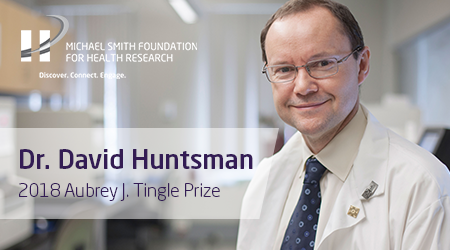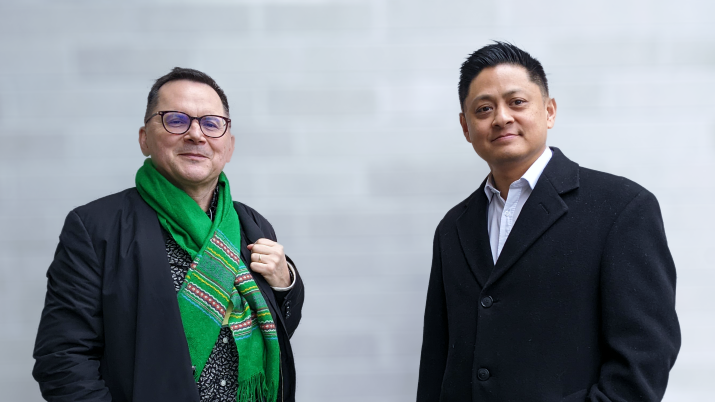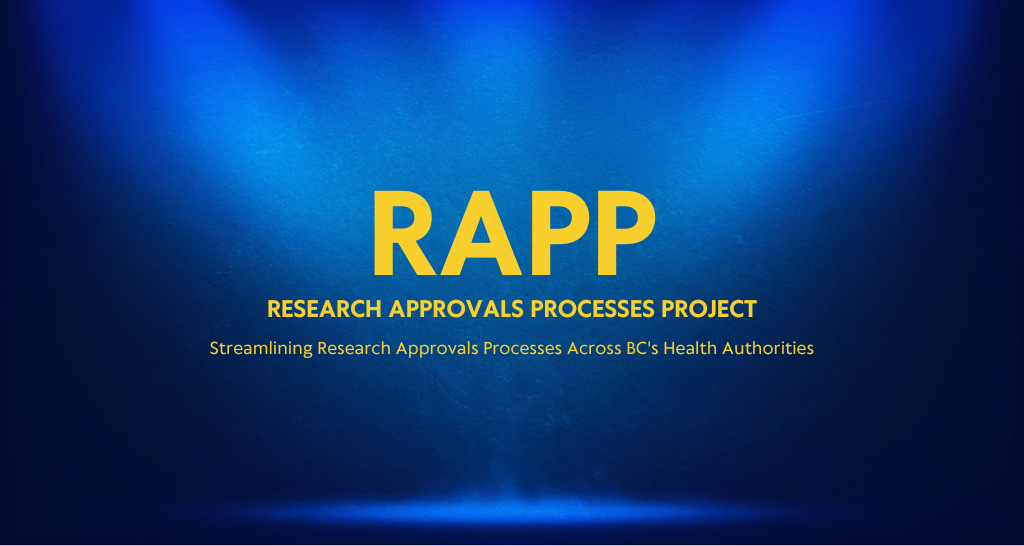Dr. David Huntsman: Redefining gynecological cancer prevention and treatment
16 April 2018

Dr. David Huntsman was one of the first genetic pathologists. Now a world-renowned expert in cancer genetics, his research has had a transformative effect on cancer prevention and treatment, particularly in the field of ovarian cancer.
MSFHR is proud to have supported Dr. Huntsman’s career over the years. He received MSFHR Scholar awards in 2002 and 2007, as well as a 2004 Research Unit award to support his work at the Genetic Pathology Evaluation Centre.
On April 19, Dr. Huntsman will be presented with the 2018 Aubrey J. Tingle Prize in recognition of his contribution to health research and the health system in BC and globally. Here, he reflects on his journey from rural family doctor to genetic pathologist, and the collaborations that have made this possible.
Take us right back to the beginning, what inspired your interest in cancer genetics?
I started my medical career as a family doctor in Labrador where I developed a great respect for how family doctors have to know a bit about everything. But, after a couple of years I realized that I’m inherently programmed to try and know everything about something specific, so I decided to specialize. I’d always found disease itself interesting, so I chose to be a pathologist and as BC was the best place to do pathology training I joined the pathology residency program at UBC.
About half way through my training I started to get quite depressed by the state of pathology practice and felt that it hadn’t significantly progressed since we first start started using microscopes to look at tumour cells back in the 1860’s. However, as I was interested in molecular biology and molecular genetics, I decided to combine these fields and try to become a genetic pathologist or genomic pathologist – something that didn’t exist at the time.
After my pathology and genetics training I went to Cambridge, UK on a research fellowship and tried to convert myself from a family doctor who became a specialist physician into somebody who could meaningfully address important questions through research.
Once you’d completed your training, how did you apply that knowledge?
After a couple of years running the DNA labs at BC Children’s Hospital I moved to BC Cancer to dedicate myself to cancer research.
Initially I focused on families with hereditary stomach cancer and then breast cancer biomarkers, making use of the tremendous pathology and data resources we have in BC to build a validation system to try and take tumour biomarkers from around the world and determine which could be used to either to diagnose cancers, or predict the course of a disease, or how well it might respond to treatment. This effort, with my colleagues Blake Gilks and Torsten Nielsen, led to the development of the Genetic Pathology Evaluation Centre at Vancouver General Hospital which was funded by MSFHR in 2004 and is now probably the world’s leading biomarker validation lab.
When did you make the shift from breast cancer to ovarian cancer?
I started to feel that although there were still important questions to address in breast cancer, there were plenty of smart people focusing on the area. Around the same time gynecologic oncologist Dr. Dianne Miller called a meeting and declared she was sick of seeing women die of ovarian cancer and suggested that if we worked together maybe we could do something about it. I realized that ovarian cancer was a disease which my skills could be meaningfully deployed to study and this meeting was both the start of my focus on ovarian cancer research and OvCaRe, an ovarian cancer research program aimed at improving patient outcomes.
Ovarian cancer is the fifth most common, and the most serious, cancer in women. How did you go about tackling the disease?
We started by asking the question why, despite great effort by many smart people around the world, have we failed to make any progress in improving outcomes for women with ovarian cancer. And quite quickly we realized that we had been looking at the problem in the wrong way. To date, ovarian cancer had been treated as a single problem, but it is actually a series of problems with sub-types that are completely distinct diseases.
Knowing that, we decided to take two approaches – biologically informed prevention and reverse engineering each subtype through genomics. This was different from most other groups around the world which focused on early detection, and I think our decision has been borne out.
In terms of prevention, discoveries made in Holland and elsewhere told us that most of these cancers don’t actually come from the ovary, they either start in or pass through the fallopian tube before growing in the ovary. This created a great cancer prevention opportunity. By removing the fallopian tubes whenever a woman has a hysterectomy or tubal ligation, we can reduce the incidence of these cancers by up to 30%. This program, initiated and led by Dr. Dianne Miller of OvCaRe, has taken off internationally and in most countries is known as the British Columbia protocol.
Our second approach was to learn more about the diseases themselves. In collaboration with the Genome Sciences Centre we did the first sequencing studies of ovarian cancer. This led to the discovery of key mutations in several types of ovarian cancer and endometriosis. We have since managed to turn those discoveries into diagnostics and we are working to bring them into the clinic as new treatment targets.
Alongside your research you have founded Contextual Genomics. What prompted you to make the jump into commercialization?
Myself, Sohrab Shah and Sam Aparicio (a former winner of this prize), collaborating with Marco Marra at the Genome Sciences Centre, got to ride the crest of the wave in terms of the application of next generation sequencing in cancer. Together Sam, Sohrab and I spent a lot of time discussing how to use this new technology to help patients more immediately, and more widely.
We realized that if we wanted to help the maximum number of people we would need to create a platform which was scalable, could work for cancer patients wherever they existed on the planet, and was great value for money. So created Contextual Genomics as a platform to support cancer testing.
We wanted to make our tests 10-fold cheaper than existing alternatives, so we worked backwards to figure out how much clinical quality could we build into $350. Now our assay is used in Australia and South America, and we’re slowly expanding into other markets.
You’ve achieved a huge amount in your career already, where is your research going next?
OvCaRe is one of the top two or three ovarian cancer teams in the world. It’s much smaller than other teams but in terms of the impact I don’t think there are other groups which compare.
A year or so ago, when thinking about how we could have the widest and deepest impact, we realized that we should broaden our focus from ovarian cancer to include gynecologic cancers. So with other researchers such as Lori Brotto (UBC & BC Women’s Hospital + Health Centre) and Gina Ogilvie (BC Centre for Disease Control & BC Women’s Hospital + Health Centre) we’ve built a plan for a gynecologic cancer research team that I believe, if appropriately resourced, could decrease death and suffering from these cancers by 50% in the next 15 years. We have about two-thirds of the people in place already and with some strategic recruitment and community support we are working hard to make this happen.
I’ve had massive support from BC Cancer, the Vancouver General Hospital Foundation and UBC over the last 20 years, and I’m one of a generation of successful researchers whose careers were made possible through MSFHR support. However, in addition to peer reviewed operating grants and local foundation support, OvCaRe and our research would not have been possible without community involvement. In particular the women of BC, who when diagnosed with ovarian cancer respond to this terrible news with an act of generosity and almost invariably give us access to their tissue samples for research. It’s humbling how this isn’t an exception, it’s the way women in BC respond, and we would not be able to do this work without them.
Dr. David Huntsman is a professor in the departments of pathology and laboratory medicine and obstetrics and gynecology at UBC, and is the Chew Wei professor of gynecologic oncology. He is a researcher with the BC Cancer Research Centre and the Vancouver Coastal Health Research Institute.
The Aubrey J. Tingle Prize is awarded annually to a British Columbia clinician scientist whose work in health research is internationally recognized and has had a significant impact on advancing research in his or her field — as well as the uptake of this evidence — to improve health and the health system in BC and globally.
The 2018 Aubrey J. Tingle Prize will be presented on April 19, 2018 at the 20th annual LifeSciences BC Awards.





